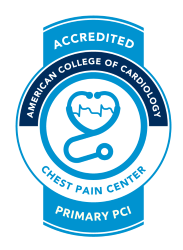Chest Pain Center
Havasu Regional Medical Center has received full accreditation as  a Chest Pain Center with Primary Percutaneous Coronary Intervention from the American College of Cardiology’s Accreditation Services. We are dedicated to providing our patients with the best heart care treatment available. As an accredited facility, we use the newest methods and best practices in heart care to ensure that our patients receive:
a Chest Pain Center with Primary Percutaneous Coronary Intervention from the American College of Cardiology’s Accreditation Services. We are dedicated to providing our patients with the best heart care treatment available. As an accredited facility, we use the newest methods and best practices in heart care to ensure that our patients receive:
- Right care at the right time to minimize or eliminate heart damage due to heart attack
- Timely and accurate diagnoses to reduce the disruption to your life and get you back home as soon as possible
- Help and communication to better understand how to respond to your heart emergencies
- Improved quality of life after a heart episode
Understanding Chest Pain
While some heart attacks are sudden and intense, many start less noticeably, with mild pain or discomfort at first. The most common heart attack symptom, for both men and women, is chest pain or discomfort. But women are somewhat more likely to experience some of the other common symptoms, particularly shortness of breath, nausea/vomiting, and back or jaw pain.
The American Heart Association lists the below as the major signs of a heart attack:
- Chest discomfort. Most heart attacks involve discomfort in the center of the chest that lasts more than a few minutes, or that goes away and comes back. It can feel like uncomfortable pressure, squeezing, fullness or pain.
- Discomfort in other areas of the upper body. Symptoms can include pain or discomfort in one or both arms, the back, neck, jaw or stomach.
- Shortness of breath with or without chest discomfort.
- Other signs may include breaking out in a cold sweat, nausea or lightheadedness.
Women are more likely than men to experience some of the other common symptoms, particularly shortness of breath, nausea/vomiting and back or jaw pain.
If you are having chest pain symptoms, call 9-1-1.
What is Early Heart Attack Care?
Early Heart Attack Care (EHAC) education teaches you to recognize the early signs and symptoms of a heart attack. Why? We want you to become an active bystander, so you can save a life — even if it's yours. About 750,000 people in the U.S. have heart attacks each year. Of those, about 116,000 die. Approximately 50% of these patients experienced early symptoms. Did you know that most heart damage can occur within the first two hours of a heart attack? EHAC encourages you to know the subtle signs of a heart attack and act on them before heart damage occurs.
Someone might have one or more of these common symptoms. When they start, they can be mild or come and go. Over time, the symptoms and pain become more intense. Stay alert and always pay attention to chest pressure.
- Feeling of Fullness
- Pain that travels down one or both arms
- Jaw pain
- Excessive fatigue or weakness
- Anxiety
- Nausea or vomiting
- Back pain
- Shortness of breath
- Chest pressure, squeezing, aching, or burning
If you miss the early signs and someone collapses, call 9-1-1 and begin Hands-Only CPR. It takes just minutes to learn, but you could be adding years to someone’s life. If an AED is available, deploy it as soon as possible. AED’s provide easy to follow verbal instructions in order to help someone.
If you are having chest pain symptoms, call 9-1-1. To learn more about emergent heart care at our facility, visit our Emergency Room webpage.
